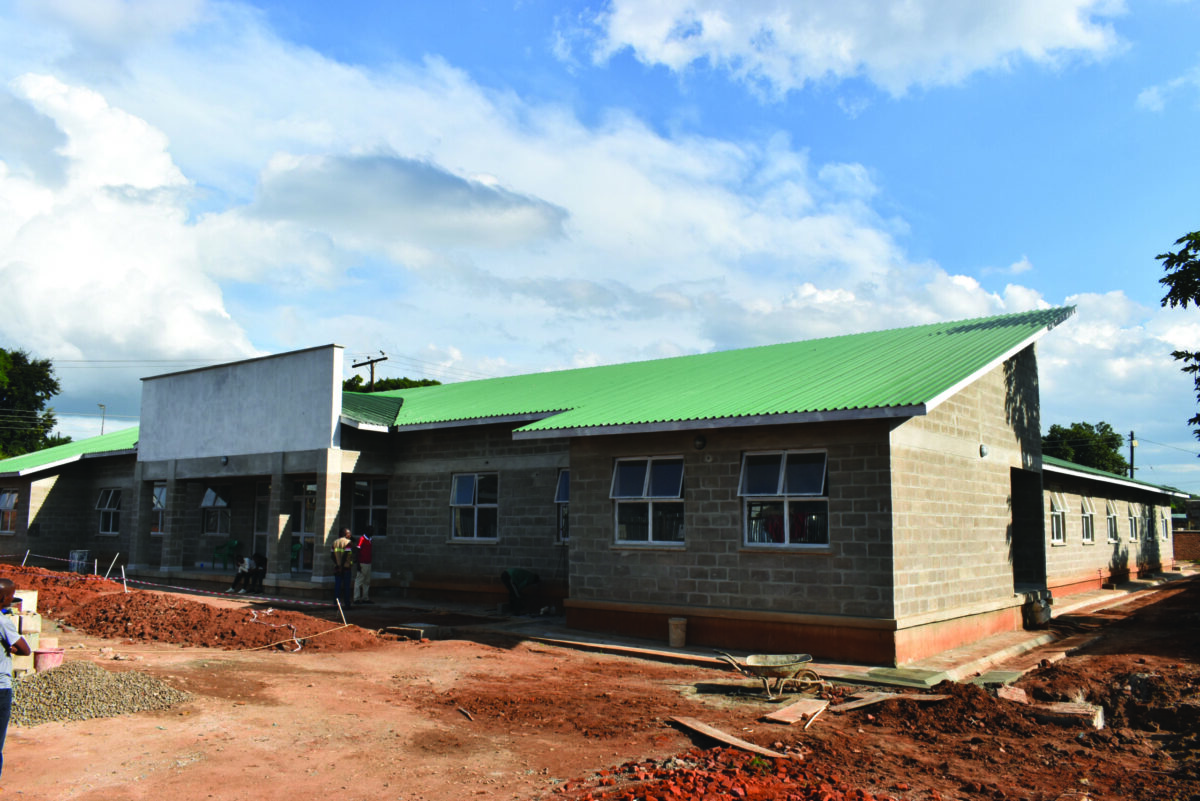'A Compelling Project for Good'
Posted on March 8, 2024
In Malawi’s capital Lilongwe, a city of 1.1 million people, HIV prevalence in adolescent girls and young women between 15 and 24 years old is three times higher than in males in the same age group. UNC runs the only specialized sexually transmitted infection clinic in Lilongwe, serving 15,000 clients a year — 60 percent are women and 25 percent are living with HIV. But the clinic building is crumbling, has no ventilation and leaks during the rainy season. A new state-of-the-art clinic building will open in March for research, education, care and treatment.
(Photo: UNC/Jon Gardiner ’98)
When Irving Hoffman ’94 (MPH), director of international operations for the Institute for Global Health and Infectious Diseases, called his longtime friend Hyman Bielsky ’76 (’80 JD) in Sunny Isles, Florida, he wanted to talk about fundraising for a new reproductive health clinic in Malawi. He hoped he might tap Hyman’s business expertise to get ideas. He never imagined Hyman and his wife, Marietta ’77, would donate all of the funding needed — full stop.
“We were sitting in our living room, looking at the clinic proposal Irving sent us, and we immediately understood the good the clinic would deliver,” Hyman said. “In this world, there are not many things that are black and white like that.”
Built in the 1970s, the current clinic within Bwaila Hospital sits at the heart of a busy town center in the Malawi capital of Lilongwe in southern Africa. The building was originally the site of the Lilongwe district’s tuberculosis registry and was renovated by UNC in 1997 to become the country’s first HIV treatment center.
Today, it’s the go-to clinic for many people seeking public health services. It’s also the only specialized sexually transmitted infection clinic in the capital, serving 15,000 clients a year — 60 percent are women and 25 percent are living with HIV. Clients seek same-day diagnostic, treatment and preventive services for sexually transmitted infections, STI risk reduction and couples counseling, as well as condoms and HIV pre-exposure prophylaxis — all in a crumbling building without ventilation that leaks during the rainy season.
“Malawi is where everything started. All global health at UNC began in this clinic, looking at the relationship between HIV and the traditional sexually transmitted diseases,” said Hoffman, who co-founded UNC Project Malawi with physician Myron Cohen in 1990 and is its international director. “It’s been a valuable platform for our research in reproductive health, HIV and many other sexually transmitted diseases from the very beginning.”
The clinic is the base for research in the development of HIV management, a syphilis and gonorrhea vaccine, the monitoring of antibiotic resistance to gonorrhea (sponsored by the World Health Organization), the investigation of nongenital sites of gonorrhea among women and interventions to address excessive alcohol use, which hinders adherence to prevention programs. Researchers are also working to determine the best approach for providing pre-exposure prophylaxis for HIV to the most at-risk populations, as well as the causes of genital ulcers, to refine the treatment approach.
But in recent years, an aging infrastructure has made provision of care and the conduct of research more challenging. UNC Project Malawi country director Innocent Mofolo said the new facility will provide a safe environment for patients with COVID and other emerging diseases, as well as for staff, who are often overwhelmed by the number of patients and limited space.
“Receiving care in a good environment is therapeutic in itself,” Mofolo said. “This will be a state-of-the-art site for research, education, care and treatment, and most of all healing.”
Women, who are more vulnerable to HIV infection and sexually transmitted diseases due to complex social and cultural norms of Malawian society, will particularly benefit from the services. HIV prevalence in adolescent girls and young women between 15 and 24 years old is three times higher than in males in the same age group.
“Women in Africa can be powerful instruments for change in their families and communities when they can make choices about their health with access to health services,” said Marietta Bielsky.

The facility will offer new opportunities to deliver reproductive health care and STI/HIV research, while building local capacity for training residents and fellows from Malawi and the U.S. who are studying family medicine, urology, gynecology, pharmacology and epidemiology. (Photo: UNC Institute for Global Health & Infectious Diseases)
Hoffman and the Bielskys met in Chapel Hill in 1976. Friendships that started with pickup basketball at Woollen Gym soon saw marriage and family, and through the years, successful careers. Hyman Bielsky graduated from UNC School of Law, practicing law before changing to business. Hoffman graduated from Duke’s Physician Assistant Program and what was then UNC’s School of Public Health and joined the UNC faculty in 1992. Hyman and Marietta saw Hoffman engaged in pioneering work in HIV and sexually transmitted diseases, and the research would propel UNC into the global health spotlight.
“We’re really proud of the work he’s done, and we know this project is going to be done right because he’s involved,” Marietta said. “This was an opportunity too good to turn down.”
Construction on the one-story, 11,700-square-foot building is expected to be completed in March. Mitch Matoga, Project Malawi’s director of STI research and clinical services, said design efficiencies will improve the patient experience.
“We’re looking forward to having adequate space and personnel to provide high-quality care,” he said. “Our research participants will be comfortable and waiting times will be improved tremendously. With the new space, we will be able to implement several research protocols at the same time without worrying about space or privacy of our participants.”
The Bielskys are philanthropists who admit they weren’t looking to fund a clinic in Malawi, but they’re glad the opportunity introduced itself. “We feel fortunate we were offered the chance because we genuinely believe this is a compelling project for good,” Hyman said. “We’re honored to be associated with it.”
— Kim Morris
Morris is communications manager at UNC’s Institute for Global Health and Infectious Diseases. This article first appeared on the institute’s website.
